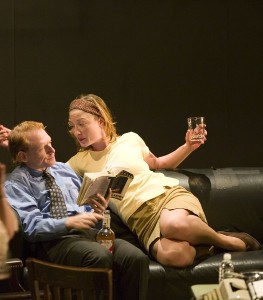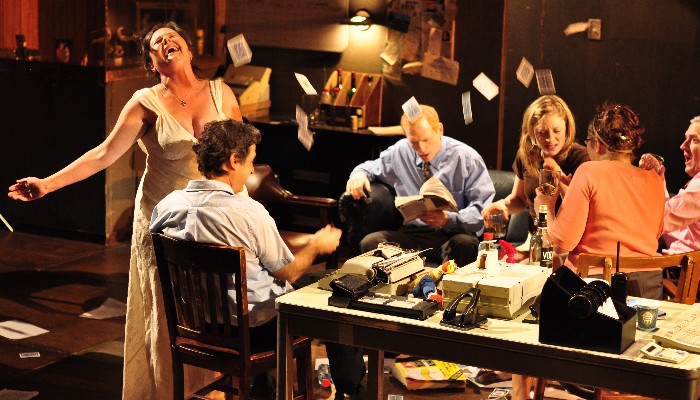Theater Review: All Glory to “Gatz” — “The Great Gatsby” Takes the Stage
In Gatz, F. Scott Fitzgerald’s words come at the audience like bullets because they are so relevant to so much of American life today. And create the kind of catharsis, that peculiar combination of pity and fear, that is the mark of truly great theater.
Gatz. Text from The Great Gatsby by F. Scott Fitzgerald. Directed by John Collins. Staged by the Elevator Repair Service. At the Public Theater, New York City, NY, through May 13.
By Roberta Silman
When F. Scott Fitzgerald died in 1940, he was 44 years old and considered a literary failure who had written some wonderful short stories; a wildly successful first novel, This Side of Paradise; three more not-so-successful novels, The Beautiful and the Damned, The Great Gatsby, Tender Is The Night; and also a memoir called The Crack-up and an unfinished novel, which was ultimately published as The Last Tycoon.
His sudden death from a heart attack occurred when his life was really more famous than his work: the boy born in St. Paul, Minnesota who came to Princeton, went into the army, and met his southern belle, Zelda. After their marriage, he and Zelda became emblematic of the “Jazz Age,” living wildly and dangerously all through the 20s. By the 30s, both were alcoholics, Zelda had been committed to a mental hospital, his daughter Scottie, who had been born in 1921, was in boarding school, and Scott had gone to Hollywood to write screenplays and resolved to stop drinking. There he fell in love with the Hollywood columnist Sheilah Graham and hoped for a fresh start, but it was not to be. He died thinking he was a footnote to American literature, never dreaming that by the late 1950s he would be considered one of our greatest writers.
And what would he think of the amazing production that is part play and part reading of every word of The Great Gatsby called Gatz that is now being staged at the Public Theater in New York by the Elevator Repair Service? We will never know, but as I sat there two weeks ago waiting for the performance to begin, I imagined him sliding into a seat in the back not only with pride but also with the satisfaction that what he had wanted for himself, “to be read through the ages,” as his beloved Keats had predicted for himself, had, indeed, come to pass. (Gatz was presented by Cambridge’s American Repertory Theater in January 2010.)
“This is either going to be fantastic or a bust,” our friend Burt said as he greeted us in the lobby of the Public, which is under construction and more like an obstacle course than a lobby. We nodded and took our seats; the “play” began at 3 p.m. and was scheduled to end at 11 p.m. Our program told us there was one break before the dinner break and then another break after dinner. We settled into our seats knowing that we had opportunities to leave if this theatrical marathon proved too much.
This experimental rendering of The Great Gatsby is the brainchild of the Elevator Repair Service, which was founded in 1991 by John Collins, who directed this production. According to the program, the company “creates innovative original works” with an ongoing ensemble and has achieved wide renown all over this country and abroad. We actually saw their adaptation of The Sun Also Rises last June; it was not a complete reading of Hemingway’s text, more a play, and had some charming moments, but it wasn’t wonderful. However, there had been raves from Ben Brantley of The New York Times and others when Gatz played in New York in 2010, so here we were, glad to have tickets to this limited run from mid-March to early May.
When the lights went out (there was no curtain), we were confronted with a messy, modern office—steel bookcases, shelves filled with boxes, people sitting at desks, a computer that was obviously in trouble, and women bustling about in a small office at the rear. This was the parallel universe that would somehow lead us back into the novel, which takes place in 1922 and has many references to World War I and is set in Manhattan and an imaginary community on Long Island’s north shore called East Egg, which resembles the actual town of Great Neck. In the midst of the silence of a relatively busy, somewhat messy office, one of the young men picked up a paperback and started to read, and for the first 20 minutes, it was hard to know what to think. His voice was quite flat, and he didn’t look at all like what we imagine Nick Carroway, the narrator, might look like. My heart sank. I shifted in my seat. But, then, with almost no warning, we were in Tom and Daisy’s house. The office workers had metamorphosed into Jordan Baker and the Buchanans, and in very short order, we were in the apartment above George Wilson’s garage, and the reading had changed into the drama unfolding before our eyes.
By the first break, we were excited but not absolutely sure we were going to see this marathon to the very end. But by the dinner break, we had been drawn into the book in a way that is difficult to explain, for there were stretches of reading in which the shapes of those beautiful sentences started to mesmerize us, and then, without warning, we were watching a dramatic scene. Drab office girls became, quite miraculously, the girls who attend Gatsby’s famous parties, and Gatsby himself was transformed from a colorless man behind a typewriter to the mysterious and troubled character who drives the narrative of this amazing book.
And anchoring it all was Scott Sheperd, the reader who is Nick, whose love for Fitzgerald’s words never flags (one interview said he had memorized the entire book) and whose loyalty to those words never creates anything approaching melodrama. He simply lets the sentences speak for themselves, and as he reads and as he and his colleagues dramatize the great scenes, we began to see and hear the novel in ways that you never can by just reading it silently or even listening to an audio tape.
At dinner there was no talk of leaving, and the evening part of the experience just got better and better as all the seeds Fitzgerald had so carefully planted in the first part of the book grew into blossoms of extraordinary color and range. The last act is absolutely riveting, and what came through more clearly than ever before—and I have read this book several times—is that this is not a book about Gatsby’s parties, which high school kids seem to take away from it although there are, as a percentage, surprisingly few passages about the parties. No, what is so very clear, and emphasized more strongly when Gatsby’s father appears, is that this is a book about America, about all the flaws and strengths that this great and diverse country possesses, about the difference between the culture of the east and that of the midwest, about the haves and have-nots, and, most poignantly, about longing—yes, for sex, financial security, and success but also for love and friendship and integrity and, in the most elemental way, love of country.
This is also a book about violence: from the moment that Tom Buchanan breaks Myrtle’s nose, its ominous threat hovers over all these characters and triumphs, horribly, in the end. When Nick reads those famous lines, “They were careless people, Tom and Daisy—they smashed up things and creatures and then retreated back into their money their vast carelessness, or whatever it was that kept them together, and let other people clean up the mess they had made . . .” Fitzgerald’s words come at the audience like bullets because they are so relevant to so much of American life today. And they create the kind of catharsis, that peculiar combination of pity and fear, that is the mark of truly great theater.
If you can, get to Manhattan and see this wonderful play.
Roberta Silman is the author of Blood Relations, a story collection; three novels, Boundaries, The Dream Dredger, and Beginning the World Again; and a children’s book, Somebody Else’s Child. She can be reached at rsilman@verizon.net.
Tagged: Elevator Repair Service, F Scott Fitzgerald, Gatz, John Collins, Public Theater, Scott Sheperd



I feel so bad about Scott Fitzgerald dying convinced he was a failure that a production like this makes me, like you, hope that somehow his spirit is in the back row watching.